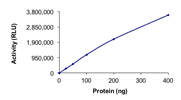
SPHK2, Active(S18-102G)
FOR BULK ORDER REQUESTS PLEASE CONTACT US
Description :Recombinant full-length human SPHK2 was expressed by baculovirus in Sf9 insect cells using an N-terminal GST tag.
Species :Human
Tag :GST tag
Expression System:Sf9 insect cells using baculovirus
Sequence :Full length
Genbank Number :NM_020126
Specific Activity :Sample Kinase Activity Plot. For specific information on a given lot, see related technical data sheet.
Purity :Sample Purity Data. For specific information on a given lot, see related technical data sheet.
Storage, Stability, and Shipping :Store product at –70oC. For optimal storage, aliquot target into smaller quantities after centrifugation and store at recommended temperature. For most favorable performance, avoid repeated handling and multiple freeze/thaw cycles.
Applications :Kinase Assay
Molecular Weight :~110 kDa
Gene Aliases :None
Scientific Background :SPHK2 is a member of the SPHK family and catalyzes the phosphorylation of the lipid sphingosine, creating the bioactive lipid sphingosine-1-phosphate (S1P). Sphingolipid metabolism regulates proper uterine decidualization and blood vessel stability (1). SPHK2 is involved in the regulation of chemosensitivity by controlling ceramide formation and the downstream Akt pathway in human colon cancer cells. SPHK2 plays an important role in migration of MDA-MB-453 cells toward the ligand EGF. The N-terminal-extended form of SPHK2 has a role in serum-dependent regulation of cell proliferation and apoptosis (2).
References :
1. Mizugishi, K. et al: Maternal disturbance in activated sphingolipid metabolism causes pregnancy loss in mice. J. Clin. Invest. 1172993-3006, 2007.
2. Hait, N. C.et al: Regulation of histone acetylation in the nucleus by sphingosine-1-phosphate. Science 3251254-1257, 2009. NoteErratumScience 326366 only, 2009.
Product Sheets (By Lot #) :
Research Areas :Angiogenesis, Apoptosis/Autophagy, Cardiovascular Disease, Invasion/Metastasis, Lipid Kinases, Neurobiology, PKA/PKC Pathway
